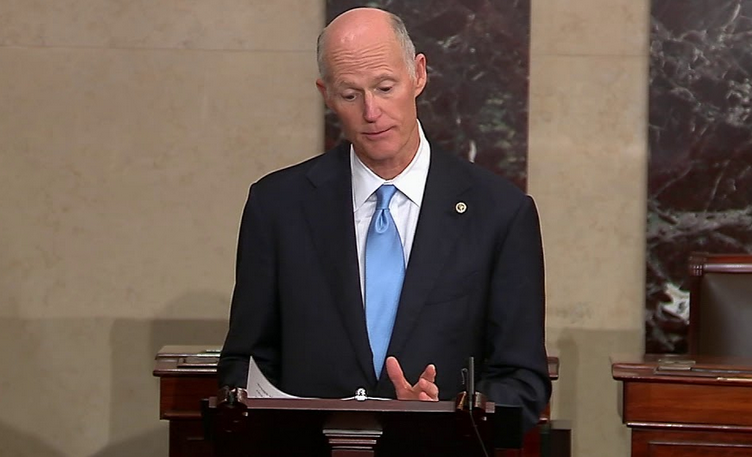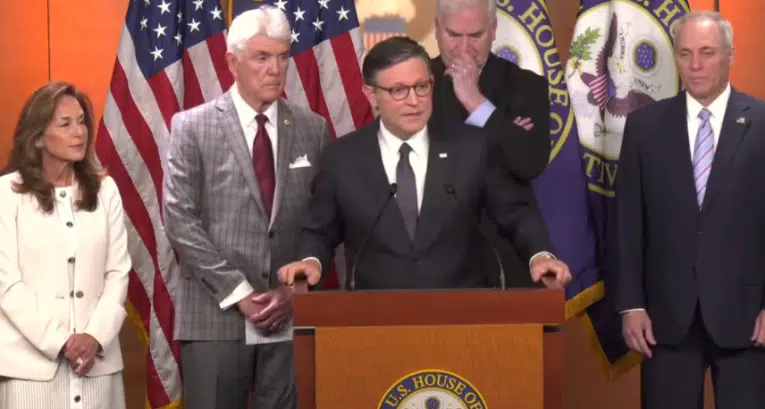
“I just think there’s a difference of opinion. Some people don’t want to have a plan.”
That was Sen. Rick Scott (R-Fla.) on Fox News with Laura Ingraham on March 7 responding to criticism from within the Senate Republican Conference of his Rescue America plan located at www.rescueamerica.com, an outline of the of legislative proposals and ideas for Congressional Republicans to pursue in 2023, including supporting an America first trade policy, should they reclaim the House and Senate in the 2022 Congressional midterms.
The Scott plan calls for continuing to reduce American reliance on Chinese supply chains: “We will gradually end all imports from Communist China until a new regime honors basic human rights and freedoms. We will build supply chains that rely solely on American workers and allies. We will not be at the mercy of our enemies for medications or any essential commodities. We will terminate any trade deal that takes away American jobs.”
It is very much an approach to trade that was favored by former President Donald Trump in his 2016 Electoral College victory over Hillary Clinton, helping him to secure the Rust Belt states of Ohio, Michigan, Wisconsin and Pennsylvania.
It made a big difference not only in the campaign but beyond, as Trump took an issue Republicans had been weak on for decades, and made them stronger.
In response, Senate Minority Leader Mitch McConnell (R-Ky.) publicly chastised Sen. Scott, who chairs the National Republican Senatorial Committee, essentially for daring to offer specifics, whether on tax policy, trade, immigration or anything else.
“If we’re fortunate enough to have the majority next year, I’ll be the majority leader. I’ll decide, in consultation with my members, what to put on the floor,” McConnell said, blasting a part of Scott’s proposal that called for every citizen to pay income tax, “even if a small amount.”
Agree or disagree with that part of the proposal, here Sen. Scott is offering a broad vision, not just on tax policy, but on trade, immigration, foreign policy, energy production, woke culture, etc. that Republicans in 2022 can embrace fully, or take parts that they do like, if it fits into their own campaign themes. Nobody thinks that every Republican in Congress should necessarily agree on every single issue, and where there are disagreements, there should be robust debate — not dismissing an entire plan out of hand.
On March 3, Scott further responded to the pushback from Senate Republican leaders with an oped in the Wall Street Journal, writing in part, “I have committed heresy in Washington. I’ve been in the Senate for only three years, and I have released an 11-point plan with 128 ideas on what Republicans should do after we win the coming elections and take control of the Senate and House. In the real world beyond the Beltway, Republicans and independents demand bold action and a plan to save our nation. They see no point in taking control of Congress if we are simply going to return to business as usual.”
Here’s what Scott is getting at: Republicans very likely to reclaim both the House and the Senate this year. Currently, Democrats only have a net five-seat majority in the House of Representatives right now: 222 to 212, with one seat vacant. Similarly, the Senate is tied 50 to 50, with Vice President Kamala Harris casting the tie-breaking vote for Democrats.
Normally, in midterm elections dating back to 1906 through 2018, the party that occupies the White House usually loses on average 31 seats in the House, and about three seats in the Senate. Just going by the averages, public discontent with the incumbent party, which is Biden and the Democrats, will easily put Republicans back into majorities this year.
Especially with President Joe Biden averaging just 41.6 percent approval and 52.6 percent disapproval according to RealClearPolitics, plus 7.5 percent inflation that appears destined to go double digits, the odds of a Democratic wipeout in November rise dramatically.
And Scott is afraid that if he and his colleagues do not start promoting their agenda with specifics, Republicans will simply win by default but without any mandate to govern. He’s right.
If Republicans do not tell the American people how they will govern in 2023, then they will have failed to earn and build popular support for those policies when they are finally presented. Moreover, an agendaless campaign might falter for being milquetoast. Here, Scott is focused not merely on capturing majorities — but on keeping them.
Robert Romano is the Vice President of Americans for Limited Government Foundation.





